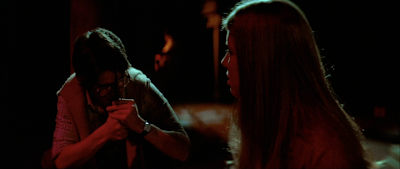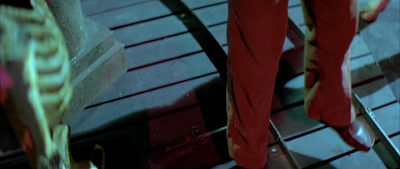"Ain't as if I'm asking you to do something you ain't never done before."
"Come on, boy! I didn't mean to hurt you."
"It's just that...sometimes, I get to drinkin'. Forget to be careful with you."
With The Barker's self-pitying words begins the most subdued and soulful passage of The Funhouse - our last stop before the teens get start to get bumped off one by one. The Barker's scene and the scene with the teens which follows are a pair of monologues in which all the film's subtext is laid bare on the table by protagonist and antagonist representatives, with all members of the opposing parties feeling equally put-upon in their roles as victims and victimizers.
Kevin Conway is playing Tobe Hooper's "Crazy Old Man" archetype, yet The Barker is actually the least deplorable elder psycho in Hooper's filmography. In terms of modus operandi, he's most analagous to Jim Siedow in The Texas Chainsaw Massacre Parts 1 and 2 - a small businessman burdened by cleaning up the messes of his psychotic family member(s), who forgives them not just as family but as partners in a way of life. Unlike Drayton Sawyer, of course, there's no profit for The Barker in having murderous, monstrous family members - just a lot of hassle. We're invited to listen to his side of the story at this moment and sympathize just a little, before the kid-killing starts. We've seen him abuse his freak son and connive to cover-up Madame Zena's murder, but Hooper and Block want us to know he at least feels bad about it. While morally inexcusable, he's no more truly "evil" than The Monster. His line about forgetting to "be careful" with his son speaks to a weird sense of sincere protective tenderness towards his physically deformed child.
Horror genre scholars, take note that The Barker is loading a revolver - a phallic weapon, sure, but not one considered graphically piercing enough for horror film murders. Especially not in the post-Halloween slasher boom. As per the more down-to-Earth nature of The Funhouse, The Barker is pretty no-nonsense about what needs to be done. Horror film killers rarely use firing weapons, because they're just so mundane. That mundanity helps keep this particular horror-fantasy grounded in reality, and is all the more unsettling.
"Come on! You need me, boy."
"You know what they would've done to you in Dallas, if I hadn't been there, don't you?"
"Them..."
"...Two little half-pint Girl Scouts in Memphis."
"Oh, that was the worst. The worst."
In a Funhouse retrospective interview on ShockTillYouDrop, Hooper mentions wanting Conway to "pace around" in this scene but instead took Conway's suggestion to stay locked down so we could watch his eyes. Definitely the right move, we've already seen him pace around when the film reintroduces him and this calmer scene provides a nice contrast. Hooper also mentions a "twisted pleasure in his look as he talked about those two half-pint Girl Scouts in Dallas (sic)" but I can't really say I agree. There IS a look of twisted pleasure from The Barker later on in the film, but this here just looks like melancholic sadness.
"It's been hard on me...real hard. Ever since your momma."
"Your little brother Tad, over there. On display like - "
" - I don't want that for you, boy! I don't WANT that for ya!"
"Having the psycho father say that the baby in the formaldehyde was the monster's twin brother Tad -- that was supposedly a last-minute script addition by Tobe Hooper. I love that. Not the whole twin brother thing. The name "Tad." It's just an excellent name for a pickled fetus, isn't it? Tad. Tad's in the jar now, son, but we're still family."
- Joe Bob Briggs, Monstervision broadcast of The Funhouse
The more I've learned about the making of The Funhouse while writing this blog, the more I've come to appreciate the degree to which serendipity and luck make a film great. Finding out that the Frankenstein mask and overarching theme of classic movie monsters was not part of the film's original conception, for example. If it was truly improvised that "Tad" would be revealed as The Monster's exploited little freak tent brother, my response is exactly the same - how could it have been any other way? It's thematically perfect.
The Barker's mention of The Monster's mother - holy hell, what kind of life must that woman have had? Did she die at childbirth the second time a monster fetus came ripping out of her womb, Larry Cohen style? So much juicy backstory is suggested to the viewer's imagination with a few simple lines like these. If "Tad" the pickled punk was given a name by his loving parents, we have to assume The Monster was also, but it's never revealed. The Monster having a little brother also adds another parallel between himself and his "bride" Amy.
The Barker's mention of The Monster's mother - holy hell, what kind of life must that woman have had? Did she die at childbirth the second time a monster fetus came ripping out of her womb, Larry Cohen style? So much juicy backstory is suggested to the viewer's imagination with a few simple lines like these. If "Tad" the pickled punk was given a name by his loving parents, we have to assume The Monster was also, but it's never revealed. The Monster having a little brother also adds another parallel between himself and his "bride" Amy.
"Now COME ON!"
"Come on, boy."
"If you just do this one last thing for me...one bad thing.
And then - we'll bury 'em, and - "
"I - I take you fishing. Well, anything you want. Just like we used to.
'Cause we gotta take care of each other."
"As God is my witness...I don't hate the sound of your voice."
This concluding sentence is one of the key lines of dialogue in the whole film. Attempting to correct what he said about not being able to "stand the sound of your filthy voice," The Barker extends what he knows his son needs; a little understanding. They really do need each other in a way I can't compare with any other familial pair of killer in horror film history. Contrasting this again to Hooper's Chainsaw films, it's not impossible to imagine a tender scene like this between Leatherface and Jim Siedow - but that's just not a side of those villains Hooper was interested in showing. The madness of The Barker and The Monster is touchingly pitiful.
RICHIE: "When I was a kid..."
"I once tried to spook my older brother...by hiding in his closet."
Meanwhile - or perhaps just a few minutes later - we are given an analogue monologue, representative of the kids' fate. Who better to deliver this than Richie, the instigator of all their trouble?
"And while I was waiting in there - to jump out and scare him -
a weird thought came into my head."
I think the mention of sibling trickery is what has Amy in rapt attention. This is such a tense scene upon first viewing, because its quietness makes you sense that it's the prelude to something terrible. It's an old dramatic cliche about distant buried memories surfacing in the face of despair, just before the guillotine blade drops - a final confession.
"What if he knew?"
"What if he knew I was in there, and he was
standing just outside the closet door?"
"Waiting to jump out, and scare ME?"
[LAUGHS]
Richie's story creeps me out because it's relatable - I think everyone has been in a similar situation as a kid at one point or another. If not, the fear he's describing is the same as been afraid of an imagined monster under your bed. As H.P. Lovecraft famously pointed out, the oldest and strongest kind of fear is fear of the unknown. At the beginning of the film, The Funhouse showed us a trickster little brother pulled from a closet by his angry older sister. Richie's monologue tells us he's always been a trickster jerk, even as a little kid like Joey. The catch-22 he's describing of being second-guessed at whether or not you're scared is what's now defined the life-and-death situation he's dragged his friends into.
LIZ: "S-so what happened?"
BUZZ: "He locked you in, didn't he?"
"I waited in that closet for three hours 'till my parents
came home and got me out."
[SOUNDS OF CREAKING, CHAINS RATTLING]
RICHIE: "I was too scared to even touch the doorknob."
RICHIE: "I pissed in my pants."
Obviously Richie never learned his lesson about pranksterism, sealing his fate - as he was locked in the closet as a kid, so too have his plans backfired again as a young adult, locking him inside the Funhouse - this time without any parents to come to his aid.
[THUNDER AND LIGHTNING CRASHES]
[LIZ SCREAMS]
In the ensuing distraction caused by the popping, skeleton, Funhouse sound effects and Liz's screams, a noose drops around Richie's neck in slow motion - a filmic effect rarely used by Hooper, so I have to assume it was the only way to make the effect read onscreen without harming Miles Chapin.
LIZ: RICHIE!!!
This is an extremely convincing stunt, and another example of The Funhouse employing methods of death rarely seen in horror. Hanging is certainly horrific, but like a gunshot, it's not a form of death that lends itself to the genre's need for suspense and release. In this case it works beautifully because what allowed the noose to slip around Richie was the diversion of the Funhouse itself - fake danger fatally distracting from real danger.
Ever the pragmatist of the group, Buzz instinctually grabs Richie's dropped dagger.
"RICHIE!!!"
As Liz cries hysterically, the cash drops down like confetti in a moment so poetically apropos that both times I've seen this film in a theater, the audience couldn't help but chuckle. I hope they were chuckling in awe and not just derisively in the opinion that such a visual is too much obvious irony. For a movie chock full of subtler ironies, this broader one is perfectly executed.
I think The Barker and The Monster got to take their father-son fishing trip a little early.























































Bravo, Matt. Great entry.
ReplyDeleteI love the Barker and Son scene as well, but it's Richie's monologue scene that is so rich. I am crazy about it - a philosophical scene plopped right into the middle of the action. From the frank story to the way it drags in each of the other kids in a way that reflects them: Amy's rapt attention, Liz's guileless need to know the ending, Buzz's unconfirmed but very Buzz-like guess as to the fallout.
I'm always surprised more people don't point out the absurdity of the hanging kill - I've always found the moment ridiculous myself (though you say it's convincing and I'm very glad about that (:). Very clever tying it in to the fishing! But that just furthers my point - what kind of an efficient way to kill is dangling a line? I think it makes very clear the abstract/"art-kill" intentions behind that method of murder.
the monster did go fishing at the funhouse.
ReplyDelete